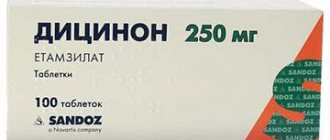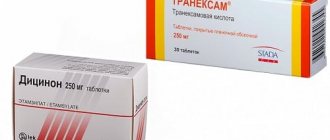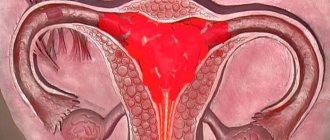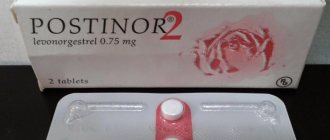Dicynone is a medicine that helps stop bleeding. It is used during surgical operations for preventive and therapeutic purposes. The product helps stop bleeding and reduce the risk of severe blood loss. How to properly take Dicynon tablets for uterine bleeding, instructions for use will help you figure it out.
Causes of uterine bleeding
Blood loss occurs in the following situations:
- Hormonal disbalance.
- Organic pathology of the genital organs (uterine fibroids, endometriosis, etc.)
- Incipient miscarriage during pregnancy.
- Oncological diseases.
- Taking hormonal medications, etc.
The reasons for the occurrence are different in each case.
Uterine bleeding due to organ dysfunction can be caused by:
- Infectious diseases (influenza, sepsis, etc.) with the development of severe complications;
- Pathologies of the hematopoietic system;
- Liver cirrhosis;
- Problems in the cardiovascular system;
- Poor functioning of the thyroid gland;
- Low levels of vitamins K, C and others.
If uterine bleeding occurs due to problems in the genital area, it can be caused by vaginal trauma, the presence of benign or malignant tumors, adenomyosis, rupture of an ovarian cyst, and inflammatory diseases. The cause of this pathology is often the incorrect use of contraceptives and sexual violence.
During pregnancy, bleeding occurs in the following cases:
- Ectopic pregnancy;
- Incipient miscarriage (chorionic or placental abruption);
- Uterine rupture.
During childbirth, the cause of bleeding can be placental abruption or trauma to the birth canal. Atonic bleeding is particularly dangerous.
During menopause, this condition may be a consequence of the following diagnoses:
- Polyps;
- Disruption of the endocrine system;
- Myoma;
- Endometrial hyperplasia;
- Malignant or benign neoplasms.
With hormonal imbalance, uterine bleeding occurs due to various situations. These include:
- Heredity;
- Diseases of the reproductive glands;
- Incorrect use of contraceptives;
- Abortion, pregnancy, postpartum condition;
- Chronic nervous stress, loss of strength, regular fasting.
Depending on the cause of the pathology, treatment is prescribed.
Many women suffering from regular uterine bleeding prefer to deal with this problem at home. For these purposes, you can use various traditional medicine recipes that have a targeted effect. Experienced specialists recommend the use of herbs, herbs, tinctures and other folk remedies in the complex treatment of uterine bleeding, as a supplement or prevention.
For various gynecological diseases, in particular with heavy uterine bleeding, the boron uterus can be used. This plant has unique pharmacological properties and is recommended for the treatment of serious gynecological diseases. While taking boron uterus, women's hormonal levels begin to normalize, fertility is restored, and uterine bleeding stops.
Before starting to take a tincture or decoction of this medicinal plant on her own, a woman should consult a herbalist or her doctor to determine the duration of treatment and dosage. In the case when a woman is undergoing hormonal therapy, the use of boron uterus is not advisable, since it contains large quantities of estrogen.
Why does this dangerous phenomenon occur?
The nature of this phenomenon is most often associated with gynecological diseases, complications of pregnancy and hormonal imbalance in the hypothalamus-pituitary-ovarian system with an increase in estrogen levels.
The following pathologies can provoke bleeding:
- infectious diseases (sepsis, influenza, measles);
- diseases of the reproductive system (endometriosis, hyperplasia, uterine fibroids, polyps, oncology);
- vaginal problems (vaginitis, cervicitis, traumatic injury);
- ovarian dysfunction (cysts, polycystic disease);
- non-gynecological diseases (hypertension, hypothyroidism, atherosclerosis);
- blood clotting disorder;
- liver pathologies.
Bleeding may result from taking certain medications that affect blood composition. A problem is discovered when carrying out hormonal therapy and using contraceptives.
Medicinal herbs
Any uterine bleeding should be treated by a doctor. The specialist prescribes medications at home and in the hospital - it depends on the patient’s condition. Medicines to stop bleeding are divided into the following groups:
- Hemostatic.
- Contracting the uterus.
- Hormonal contraceptives.
- Vitamin K substitutes.
- Medicines containing calcium.
https://www.youtube.com/watch?v=V4V-XN1KdWE
The most popular and effective are:
- Stinging nettle;
- Cucumber lashes;
- Yarrow;
- Water pepper;
- Bird knotweed;
- Kalina;
- Bloodroot;
- Shepherd's Purse;
- Yasnotka.
Here are a few time-tested recipes that can stop uterine bleeding:
- Decoction of stinging nettle. For 250 ml of boiling water, take 1 tbsp of dry herb and cook over low heat for 10 minutes. Cool, strain, take a tablespoon 4-5 times during the day.
- Infusion of common yarrow. Pour 2 tsp of dried herb into a glass of hot water and leave for about 60 minutes. Cool, strain. Dose: 50 mg per day 4 times before meals. The recipe is suitable for helping with various bleedings, not only uterine ones.
- Decoction of Potentilla erecta (galangal). Pour 2 tbsp of washed finely chopped rhizome with a glass of water, cook over low heat for 1.5 hours. After the end of the prescribed period, add liquid to the original volume, turn off, cool, strain. Take 2 tbsp before meals.
- Juice from shepherd's purse. Take a fresh plant, rinse well, squeeze out the liquid from it, dilute with water in a 1:1 ratio. Take 50 drops per tablespoon of water. Drink 3 doses a day.
- A decoction of white claspberry. A tablespoon of dried herb should be poured with 200 ml of boiling water for half an hour. Infuse in a dark place, first wrap the container. Strain, use 4 times a day, 70-100 ml.
Herbal herbs and infusions from them can be purchased in ready-made form in pharmacies. The properties and dosages of use of the most common ones are described below.
In a hospital setting
Depending on the complexity of the pathology, treatment in the hospital is divided into the following types:
- Administration of a medicinal solution in the form of a dropper;
- Blood transfusion;
- Surgical intervention;
- Uterus removal.
In addition, special medications are given that can stop bleeding. These include:
- Ascorutin. It is also used for heavy periods. Contraindicated for people suffering from chronic diseases of the digestive system.
- Calcium chloride, or “hot” injection. The advantage of the drug is that it is used during pregnancy and in the postoperative period. For good results, the injection is administered very slowly.
- Vikasol. It is prescribed depending on the amount of discharge. Both tablets and injections are used.
- Contrikal. Prescribed as a dropper for severe blood loss. It is administered until the person feels better.
- Etamzilat. Recommended for severe bleeding, enhances blood clotting and does not form blood clots.
- Aminocaproic acid. Reduces bleeding, improves liver function, and blocks the appearance of antibodies. Use involves monitoring blood composition, therefore it is prescribed only in hospitals.
In some cases, two medications are given at the same time. Such an appointment can only be made by a doctor in a hospital setting with full control over the patient.
Reviews
The effectiveness of Dicinon in the treatment of uterine bleeding is confirmed by numerous reviews from women (they can also be read on the Otzovik website):
- Leka07, Chrysostom – “I decided to write about Dicinon tablets. They really helped me in the fight against heavy bleeding. I highlight the following advantages - good quality, affordable price, sufficient shelf life. Among the minuses, I can only note a bitter taste.”
- Ro1zon, Moscow - “I definitely recommend Ditsinon. It is highly effective and has a reasonable cost. I personally didn’t find any shortcomings.”
- Elka-topor, Krasnoyarsk - “After a medical termination of pregnancy, I couldn’t stop the bleeding. At first I took Regividon. Useless. Dicinon provided real help. I recommend it to other women."
- Tanya L., Belarus - “Before, I didn’t even know about the existence of such a drug as Dicynon. It so happened that he saved my mother, me, and the child. The product is simply universal and helps against various blood losses. It is very effective for uterine bleeding.”
- Olka7286 – “Dicinon injections helped me in one day. Heavy bleeding continued for 3 days and did not stop. The doctor prescribed this drug, and the problem simply went away.”
Dicinone is recognized as an effective hemostatic drug that can stop uterine bleeding of any intensity. It can be used in the form of tablets or injections. It is important not to show excessive initiative, but to be treated only according to the scheme developed by the doctor. The right approach will eliminate side effects and ensure a quick recovery.
Interaction
Hemostatic agent. Has an angioprotective effect.
Flushing of the facial skin, dizziness, headaches, heaviness in the epigastrium, heartburn, allergies, paresthesia of the lower extremities, drop in blood pressure.
Do not mix Dicinon with other medications in the same syringe. To prevent the antiplatelet effect of dextrans, Dicynone is administered an hour before their use at a dose of 10 mg/kg. The use of etamsylate after the specified period does not produce a hemostatic effect. The drug can be combined with menadione sodium bisulfite, aminocaproic acid.
Side effects
Dicinone can cause some side effects:
- The digestive system may react with nausea and heartburn. In rare cases, discomfort and a feeling of heaviness in the epigastric region may occur.
- The effect on the nervous system causes headaches and sometimes significant dizziness, even to the point of foggy consciousness.
- From the cardiovascular system, reactions such as a decrease in blood pressure and pulse rate, and redness of the face are possible.
- Skin rashes may appear due to an allergic reaction.
Extremely rarely, reactions from the endocrine system are observed in the form of an acute form of porphyria, pain in the lower back, and paresthenia of the legs.
Pharmacodynamics and pharmacokinetics
The medication stimulates the process of platelet release from the bone marrow and enhances their formation. The drug has antiplatelet and angioprotective effects. The drug helps stop bleeding, increases the rate of formation of the primary thrombus, etamsylate enhances retraction, does not affect prothrombin time, fibrinogen concentration.
With repeated use of the drug, thrombus formation increases. Dicynone reduces diapedesis of formed and blood elements from the vascular bed, reduces fluid output, and has a positive effect on microcirculation. The drug does not affect the normal indicators and parameters of the hemostasis system.
The hemostatic effect is felt after 10-15 minutes. The peak level of the active substance is reached an hour after administration. It is excreted unchanged on the first day almost entirely in the urine.
How does the drug work?
Dicynone (Etamsilate) is a hemostatic, medicinal drug that also has angioprotective and proaggregant abilities. Its pharmacological action is based on the activation of thromboplastin formation in the area of damage to blood vessels, incl. due to the formation of large molecular mucopolysaccharides. The drug improves platelet adhesion and is actively involved in the normalization of blood coagulation factor III.
The main hemostatic effect of Dicinon is manifested in the first stage of hemostasis by improving the interaction between the endothelium and platelets. Endothelial protection, platelet adhesion, decreased capillary wall permeability, and increased prostaglandin synthesis are provided, which ultimately reduces the duration and intensity of bleeding.
At the same time, the drug helps the action of hyaluronidase and histamine, reducing vascular permeability that occurs during inflammatory reactions.
The drug is not able to have a thrombogenic effect and create a hypercoagulable effect, which makes it possible to use it even when blood is released in the form of clots.
Emergency funds
For uterine bleeding, synthetic drugs are often prescribed that have a beneficial effect on the lining of the uterus. Such a drug is dicinone.
Its pharmacological properties include the following:
- the ability to activate the process of formation of thromboplastin protein;
- normalization of blood clotting
- prevents the formation of blood clots.
Dicynone is available in several forms: tablets, injections. This drug has proven its effectiveness in treating bleeding that is localized in small vessels. After taking dicinone (the dosage should be prescribed only by the attending physician), a woman will be able to feel the effect within a few hours. Repeated testing of this drug has shown that the highest results are achieved when taking tablets rather than intramuscular injections.
To stop uterine bleeding, experts use the following regimen: two ampoules of dicinone are administered intravenously (can be intramuscularly), after which this drug is prescribed in tablet form every six hours. In order to prevent bleeding, the patient should take this drug orally, starting from the 5th day of the menstrual cycle.
Tranexam is rightfully considered the first aid for uterine bleeding, since it is very quickly able to cope with this problem. This drug has a direct effect on the blood clotting process and directly affects plasminogen (inactive). Tranexam is now available in pharmacies, both in the form of tablets and in the form of injections (intramuscular).
If moderate blood loss is observed, then tablets will be sufficient. When determining the dosage, the doctor must take into account the patient’s weight and the severity of the disease. Tranexam is often prescribed to prevent uterine bleeding, especially when preparing patients for surgical procedures.
Vikasol is a synthetic medical drug that can replace vitamin K, which is important for women’s health and takes an active part in the production of prothrombin. In the absence or insufficient amount of this vitamin, women develop bleeding.
After taking Vikasol, patients experience relief only after 12-18 hours, which is why it is not used in emergency care. Despite this, many doctors often prescribe this drug in the complex treatment of uterine bleeding, as well as for preventive purposes. Vikasol is prescribed to pregnant women after the onset of the first contractions to prevent the development of bleeding, which may develop during the onset of the active phase of labor.
For menstrual bleeding, doctors often prescribe medications that can significantly reduce the volume of menstruation.
A great effect is achieved when taking etamsylate, which has extensive pharmacological properties:
- has the ability to stop bleeding;
- activates the processes responsible for blood clotting and the rate of platelet adhesion;
- increases the elasticity and stability of capillaries, etc.
While taking etamsylate, patients do not experience internal discomfort, since this drug has a smooth effect on the female body. In the process of conducting numerous studies, it was revealed that ethamsylate does not cause sudden blood clotting, which prevents the formation of blood clots.
When uterine bleeding develops, the first action of a specialist is to prescribe a drug to the woman that can quickly provide the necessary assistance. Oxytocin, which has a selective effect on the uterus, can stop blood loss.
After taking oxytocin, the female body experiences increased excitability of muscle fibers, against the background of which strong contractions begin. This drug can be prescribed both in tablet form and as intravenous injections.
Ascorutin, which has been actively used in gynecology for many years, can provide real help to women suffering from heavy periods, which often develop into uterine bleeding.
This medicine contains the following main components: vitamin P (rutin) and ascorbic acid. Its direct effect on the female body is to strengthen the walls of blood vessels, preventing fragility and permeability of capillaries.
With long-term use of ascorutin (the duration is determined by the attending physician), tissue regeneration occurs, and the protective functions of the female body are activated, capable of resisting any negative effects.
Sharp and heavy bleeding leads to various complications. In some cases, it is necessary to quickly respond to their occurrence and alleviate the condition. First aid at home is cold. Any ice object should be placed on the lower abdomen. The easiest way is to take ice from the freezer and wrap it in gauze. After this, you should call an ambulance.
In emergency cases, specialized hemostatic drugs are administered. They are prescribed depending on the cause of the pathology:
- In case of miscarriage or abortion - sulfuric magnesia, calcium chloride, dicinone, oxytocin;
- In case of injury to the uterus or ectopic pregnancy - reopolyglucin, polyglucin.
- For dysfunctional blood loss - a one percent solution of oxytocin;
None of the above medications are recommended to be taken without consulting a specialist.
You can get rid of large blood loss with the help of some available products that are available in every home. In case of excessive discharge, a mixture of egg whites (1-2 pcs) and citric acid (0.5 tsp) will help. Mix the ingredients and drink immediately. If necessary, repeat the procedure again after a few hours.
A drink made from peppermint tea and rowan juice helps reduce bleeding. Mix the liquids in equal proportions and drink throughout the day.
In the old days, pathology was treated with orange. Unripe fruit should be boiled in its peel, allowed to cool, and then eaten.
The use of herbal medicine to stop bleeding is widespread. Infusions, extracts, and decoctions from various plants are used as an addition to the main treatment.
You can reduce bleeding during a heavy menstrual cycle using special medications or traditional recipes. The following medications are most effective:
- Dicinone (dose - 2 tablets three times a day).
- Vikasol (injections).
- Tranexam (dose - 2 tablets four times a day).
Before using any medicine or folk recipe, you should first consult your doctor.
Indications for use of Dicinone
Bleeding (intestinal, uterine and during surgical interventions), trauma, hemorrhagic diathesis, diabetic angiopathy, polymenorrhea.
What is Dicynon in tablets and ampoules for?
The medicine is prescribed to stop bleeding and prevent it: capillary, parenchymal bleeding (postoperative, traumatic, after dental interventions, intestinal, renal, pulmonary bleeding). The drug is prescribed for secondary bleeding due to thrombocytopathy, thromphocytopenia, hematuria, hypocoagulation, intracranial hemorrhage, hemorrhagic vasculitis, drug-induced bleeding, hemorrhagic diathesis.
Contraindications are: thrombosis, acute porphyria, thromboembolism, intolerance to components. In case of overdose, anticoagulants are prescribed with caution. Dicynone is taken during pregnancy after consultation with a gynecologist or therapist.
Contraindications
Dicinone is not prescribed to all patients.
It is prohibited to use the drug if you have:
- thrombosis;
- thromboembolism;
- hemoblastosis in childhood (under 12 years of age);
- acute porphyria;
- hemorrhages;
- bleeding when anticoagulant doses are exceeded;
- hypersensitivity of the body to the active substances of the drug.
Tablets and injections "Etamzilat": characteristics
Do you want to know what analogues Etamzilat has? Before doing this, familiarize yourself with this drug itself. The active ingredient in it is sodium ethamsylate. The medicine is available in different forms: injections and tablets. The medication is a hemostatic agent. It has a hemostatic effect, promotes platelet aggregation and their adhesion.
Injections and tablets “Etamzilat” (including analogues) are prescribed for bleeding: diabetic, gynecological, ophthalmological, intestinal, pulmonary, and so on. The scope of application of the medicine is very large. The medicine is actively used in surgery: during and after surgical interventions. Contraindications to the use of this drug are thromboembolism and thrombosis, as well as hypersensitivity. You can purchase medicine for no more than 150 rubles.
Table of medicines with their properties, features, average price in Moscow, available for purchase in pharmacies.
| A drug | Properties | Peculiarity | Average price (Prices are indicated in Moscow) |
| Dicynone |
|
| Tablets - 35 ₽; Injections (1 ampoule) - 10-12 ₽. |
| Vikasol |
|
| Tablets - 30 ₽; Injections (10 ampoules) - 65 ₽. |
| Etamzilat | Hemostatic |
| Tablets - 90₽; Injections - 35 ₽. |
| Askorutin |
| 45 ₽. | |
| Tranexam |
| Prevents blood clotting. | Tablets (10 pcs) - 250 ₽; Injections (10 pcs) - 1300 ₽. |
| Tugina |
|
| Injections - 250 ₽. (Not available in tablets) |
Useful video
We invite you to watch a video about the drug Dicinon:
Many women may experience uterine bleeding for various reasons. This is mainly due to a serious illness or a disorder in the production of hormones. To cope with uterine bleeding, doctors often prescribe the very popular, inexpensive and well-effective drug Dicin, so many women are interested in what Dicynon tablets are for uterine bleeding and instructions for using this drug.
Vikasol
This substitute is often chosen by patients due to its low cost. You can buy the medicine for 50-70 rubles. The active ingredient of this drug is menadione sodium bisulfite. The medicine replenishes vitamin K deficiency, which often causes bleeding. The medication has a hemostatic effect and increases blood clotting.
The main disadvantage of the drug "Vikasol" is its late action. You can notice the effect only 12-18 hours after administration. It is prohibited to use the product in the same cases as its predecessors. The drug is also not prescribed for renal failure and during pregnancy.
The drug is produced synthetically and its properties are similar to vitamin K. It is available in the form of tablets and injections. Prescribed in the following cases:
- Bleeding of various types.
- Lack of vitamin K.
- Diarrhea.
- Cirrhosis of the liver.
- Hepatitis.
The daily dose of tablets is from 15 to 30 mg three times a day. The course is prescribed by a specialist depending on the individual characteristics of the body. Intramuscularly the drug is used no more than 10-15 mg per day.
Contraindications:
- Thromboembolism;
- Hypersensitivity;
- High blood clotting;
- Liver failure;
- Pregnancy;
- Glucose deficiency.
No drug overdose was detected. Side effects include various allergic reactions.
Instructions for use of Dicinone (Method and dosage)
Hemorrhagic syndrome: three times a day, 6-8 mg/kg, duration of administration up to two weeks, if necessary, repeat the course after a week.
Diabetic microangiopathy (hemorrhages): intramuscularly 0.25 grams three times a day, injections are given for 3 months. A sterile swab soaked in ethamsylate can be applied to the wound surface to stop bleeding.
Usually take about 15 mg/kg per day. That is, 1-2 tablets at a time, 3 times every 24 hours.
Children aged three to twelve years take half the adult dose.
Dicynon is administered intravenously or intramuscularly. Usually 1-2 ampoules 3 times a day.
Used only with the permission of the attending physician. For heavy periods, 2 tablets are prescribed 3 times a day 3-5 days before menstruation and for five days after their onset. It is recommended to repeat the course at the next menstruation to consolidate.
It is not recommended to use the drug to stop menstruation.
Only under the supervision of a doctor. For uterine bleeding, it is recommended to take Dicinon by injection, 1-2 ampoules every 6 hours until the bleeding stops or the risk of its recurrence disappears.
No data available. Symptomatic treatment is recommended.
No effect
Why does the drug not help with uterine bleeding in some cases? Dicinone is considered an effective remedy, but it may not give the desired effect for a number of reasons. First of all, the dosage was set incorrectly.
An insufficient amount of the substance is simply not able to fight the pathology . It is important to correctly evaluate which form to use. Tablet Dicinon may not be effective enough in difficult cases. Finally, the effectiveness of the drug may be blocked when other drugs are used at the same time.
Oxytocin
A special-purpose drug, prescribed only in a hospital to stimulate labor, in case of miscarriage, bleeding after an abortion. Prescribed depending on the condition of the uterus. The following side effects have been identified:
- Hypotension;
- Shock;
- Nausea;
- Jaundice;
- Arrhythmia;
- Vomit.
Some of the symptoms may appear in both the mother and the baby. Use with caution with sympathomimetic drugs.
Askorutin and Tugina
Ascorutin is a drug with complex effects, available in the form of capsules for internal use. It consists of vitamins C and P, therefore it strengthens blood vessels and helps reduce their fragility. In gynecology it is prescribed to reduce bleeding, the result appears after taking the full course. It is not recommended for use in patients in the following cases:
- During pregnancy;
- Individual intolerance;
- Children under three years old.
The drug should not be taken if you have diabetes mellitus, thrombophlebitis, gout, high blood clotting, or urolithiasis.
Side effects:
- Sleep disturbance;
- Headache;
- Hypertension;
- Nausea, vomiting.
The same symptoms appear with an overdose. The drug is not recommended to be taken as an independent medicine; the best results are obtained from complex treatment.
Tugina is an analogue of Tranexam, helps reduce bleeding of various types, and is available in the form of injections. The injections are allowed to be used by pregnant women; the dose depends on the purpose for which they are prescribed. The medicine is not used simultaneously with other hemostatic agents and antibiotics.
About the side effects of the drug
When taking the drug, some side effects may occur, but after stopping the drug, they all disappear. When using the drug, the patient may feel:
- headache;
- numbness is felt in the legs;
- may feel dizzy;
- blood pressure decreases;
- discomfort is felt in the gastrointestinal tract, a person may feel sick or suffer from heartburn;
- an allergic reaction may occur;
- the face may turn red.











